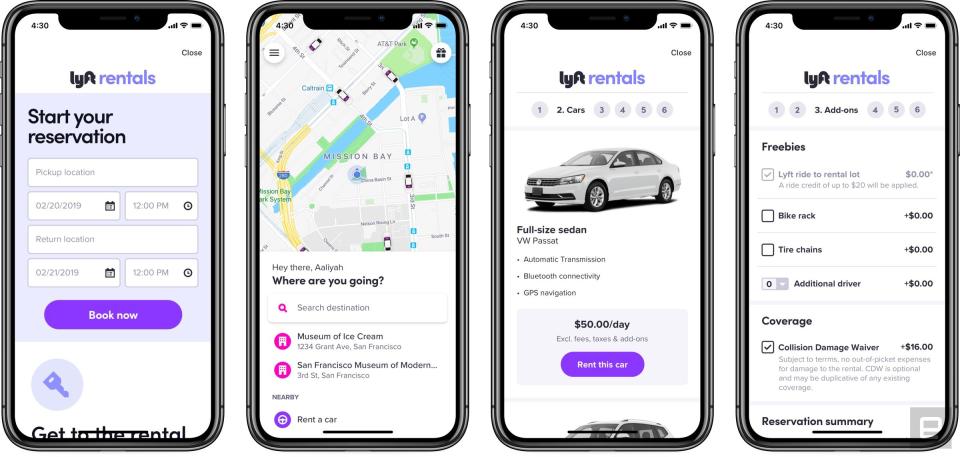Lyft just started experimenting with car rentals in San Francisco
Can Lyft succeed where Uber failed?
Between offering on-demand rides and peppering cities with electric scooters, Lyft has been pushing hard to minimize the need to actually own a car. Now, the company is exploring yet another way to further those ambitions (and boost its bottom line after a turbulent IPO in the process). Engadget has learned that, as of this week, Lyft has begun to experiment with longer-term car rentals, offering them to a small group of customers in San Francisco.
"We're constantly adding multimodal options so people can use Lyft for any kind of trip," said a spokesperson in an email confirming the program. "We've added bikes, scooters, and public transit info into the app in cities across the country, and we're currently testing a small-scale rental option for long-distance trips, like a weekend away."
While pricing isn't set in stone just yet, the first batch of Lyft renters can expect to pay about $60/day for a standard sedan and around $100/day for an SUV. According to images obtained by Engadget, potential renters will able to claim up to $20 in Lyft credit for rides to the company's rental lot in the Mission, and can request additional accessories like bike racks and tire chains at no additional cost.
At this point, it's not clear how many people Lyft has invited to participate in this test, or how many vehicles are available to rent. We do know a few things for sure, though: For one, these are brand new cars, not vehicles owned by Lyft's network of existing rideshare drivers. (That doesn't just make for a better renting experience; it also insulates Lyft against some very specific complaints from rental car companies.) There is no cap on how many miles can be driven in a day, and there are no options for hourly rentals — the minimum rental period is one day, and users can hang onto those cars for up to two weeks.
While this test program seems to fit nicely with Lyft's overall vision, its biggest rival has already proved that branching out into car rentals is no easy feat. Around this time last year, Uber launched a similar program in partnership with Getaround that let would-be drivers use cars on offer from private owners. Uber Rent, as the service was called, only operated for seven months before being shut down in November 2018.
The news also comes at a difficult time for Lyft -- in its first earnings release after its IPO in late March, the company reported a quarterly loss north of $1 billion. At the time, CFO Brian Roberts called 2019 Lyft's "peak loss year" before suggesting the ridesharing giant would inch toward profitability thanks to investments in scooter and bike deployment, plus the company's work in getting autonomous cars onto public roads.
The lure of dead-simple car rentals can't be overstated, especially in major cities where the logistics of car ownership can be downright maddening. If Lyft can make achieve these car rentals at a large enough scale, they could seriously contribute to the company's revenue and help in its long-term push for profitability. Of course, if Lyft manages to succeed where Uber fell short, expect industry incumbents like Hertz and Avis — which have seen their stock prices tank after ridesharing services came to prominence — to find new ways to fight back.



